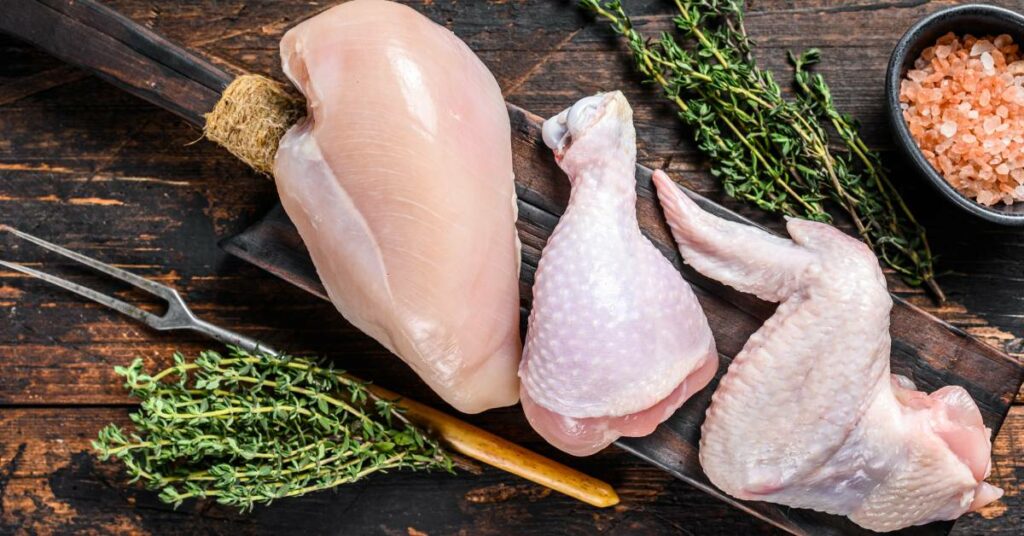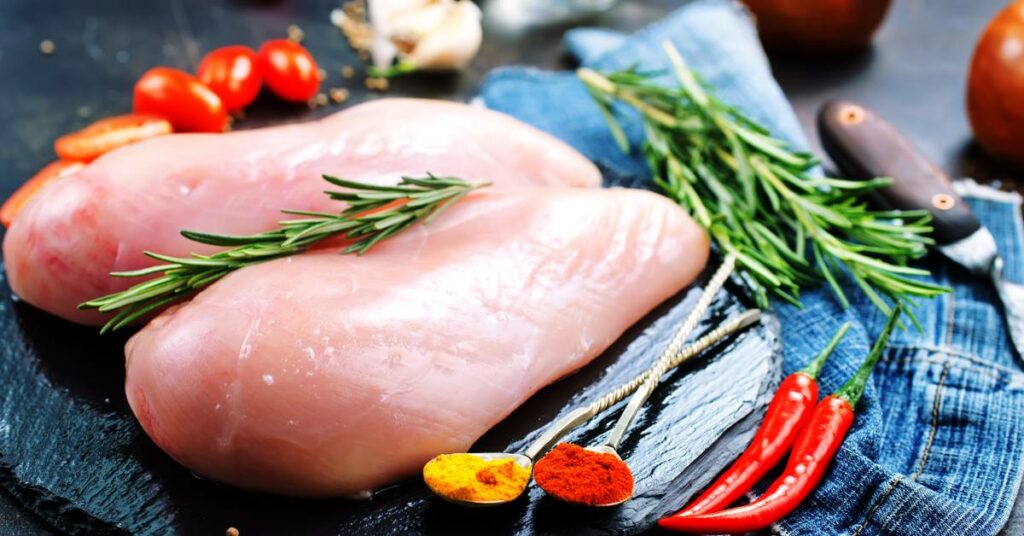Share the post "How Long to Boil Chicken Tenders? (Everything You Need to Know)"
Chicken tenders are a quick and easy way to add protein to a home-cooked meal. They are a versatile addition to any meal as they can be prepared in several ways yielding excellent results each time. If boiling is your preparation method of choice, then you’re probably wondering how long to boil chicken tenders. Fortunately, we have the answer for you;
Boiling chicken tenders will take anywhere from 8-12 minutes, depending on the thickness of your tenderloins and whether they are thawed or frozen. Your tenderloins are considered properly cooked when they reach an internal temperature of 165 F.
Boiled chicken tenders are perfect to have on hand for use in recipes that require pre-cooked meat, such as soups, casseroles, and salads. In this article, we discuss everything you need to know about boiling chicken tenders.

How Long Should You Boil Chicken Tenders?
Boiling chicken tenders can be a walk in the park even for beginner chefs; however, it is essential to keep an eye on your pan to ensure your tenderloins are not left cooking for too long.
Your chicken tenders are considered fully cooked when they reach an internal temperature of 165 degrees F.When deciding how long to boil your chicken tenders, you need to consider;
The Size of the Tenderloins
The size of your tenderloins should be considered as it directly affects the cooking time. The larger the tenderloins may take longer to cook than the smaller cut tenderloins.
It is also essential to know that uneven chicken tenderloins may need to be left in a little longer to allow the thicker pieces to cook through. This is especially a factor to be considered for home cooks who cut their tenderloins.
Whether Thawed
Thawed chicken tenders will take anywhere from 8-10 minutes to cook. To prepare your chicken tenderloins, place your tenderloins in a pot and add water or broth into the pot ensuring all the tenderloins are covered.
Bring the water/ broth to a boil, turn the heat down to medium-low, and let simmer for 5- 6 minutes. Test the chicken with a kitchen thermometer to ensure it reaches an internal temperature of 165 degrees F.
Whether Frozen
Frozen chicken tenders usually take longer to cook by up to 50% of the fresh-cut tenderloins cooking time. This is usually because the tenderloins have to thaw and cook through completely.
To make your tenderloins, place your chicken in a pot and add water or broth to ensure all the tenderloins are fully submerged. Bring the water or broth to a boil and then turn the heat to medium-low and allow to simmer for 8-10 minutes.
Test the chicken by checking to ensure that there is no pink color in the meat, and a kitchen thermometer confirms it has reached an internal temperature of 165 degrees F.
LEARN MORE: How to Tell if Frozen Chicken Is Bad?
What Are Chicken Tenders and How Should You Boil Them?
Chicken tenders are widely popularized by fast food places as kid-friendly menu items, and one can’t help but wonder whether they are simply the invention of commercial appeal.
Chicken tenders are a thin strip of meat loosely attached to the underside of a chicken breast and are removed by gently pulling or slicing the piece off.
They bear the exact taste and texture as the breast meat and are often sold separately in a pack of 10- 12 pieces.
When prepared right, chicken tenders are moist and full of flavor. Here is the boiling preparation method to make the most out of your chicken tenders;
Boiling
Boiling is perhaps the oldest cooking technique dating back 2 million years. It is easy to prepare a meal, often with water and seasoning. Boiling chicken tenders is ideal as it provides you with tenderloins that can be incorporated into other recipes.
Unlike the above preparation methods, boiled chicken tenders can be stored in the freezer for recipes that prefer already cooked meat. Despite the multiple debates amongst home cooks, boiling chicken tenders is a matter of preference and convenience.
Can You Over Boil Chicken Tenders?
Yes, it is possible to over boil chicken tenders, resulting in dry and stringy tenderloins.
Despite the belief that boiling meals keeps the moisture in, over boiling your chicken tenders eventually causes the protein to contract and release the moisture, resulting in an elastic and rubbery texture.
If you still believe your tenders are undercooked after the recipe specified time, check every 5 minutes to prevent over-boiling.
Can You Make Chicken Tenders at Home?
You can easily grab a pack of chicken tenders from the poultry aisle of your local grocery store or favorite butchery. However, if these options are unavailable, making chicken tenders at home will take you less than 5 minutes.
To make homemade chicken tenders, take a piece of boneless and skinless chicken breast and cut the breast lengthwise, ensuring the cuts are half an inch thick. Try to ensure that the cuts are of equal sizes and do not affect cooking time.
LEARN MORE: Can You Eat Cold Chicken?
Nutritional Benefits of Chicken Tenders
Chicken meat is an excellent source of protein, and unlike red meat, it contains unsaturated fats making it ideal for weight watchers and fitness fanatics. The nutritional benefits of consuming chicken tenders include;
They Are Good for Muscle Mass
Proteins are generally referred to as body-building foods and promote muscle strength. Studies show that consuming adequate proteins facilitates an increase in muscle mass. With weight training, an increased intake of protein facilitates visible muscle growth.
They Help in Bone Strength
For a while, scientists believed that consuming excess proteins increased the acid load in the body, which caused the calcium content in the bones to leach, thus weakening them.
Recent studies have debunked this misconception and show that consuming protein like chicken tenders is necessary for bone health as these proteins improve strength, preventing fractures and osteoporosis.
They Boost Metabolism
Being in the body-building food category, chicken tenders are known to help boost metabolism. Proteins are known to have a higher thermic effect than other food classes.
The thermic effect refers to the rate at which the body burns down calories which help to boost metabolism.
They Assist in Weight Loss
Due to the fact that they are good for facilitating higher metabolism, chicken tenders are a good option for anyone trying to lose weight.
Studies have shown that consuming a protein-rich diet results in weight loss as it causes a reduction in calorie intake.
However, the preparation method ultimately determines how many calories a serving of chicken tenders.
Does Boiling Chicken Tenders Affect the Nutritional Value?

Boiling chicken tenders is considered the healthiest way to prepare tenders as it does not involve adding any fats or extra calories to a serving.
Boiling your chicken tenders does not affect the protein content in your tenderloins; however, the fat content may change.
Over boiling, however, will rid your tenderloins of valuable nutrients. According to a study published in the Journal of Food Engineering, over-cooking chicken and other meats beyond a temperature of 212 degrees F will strip the meat of vitamin B.
LEARN MORE: Why Is My Chicken Rubbery?
Conclusion
Boiling tenderloins is easy to ensure you have a nutrient-filled protein you can pull out to amp other recipes. Now that you know the basics of boiling your chicken tenderloins, you can prepare this easy-to-make dinner option.
So, now you know how long to boil chicken tenders, follow our tips and tricks to ensure your boiled tenders come out moist and juicy. Don’t be afraid to season your tenderloins and add a new twist to your homemade tenderloins!

